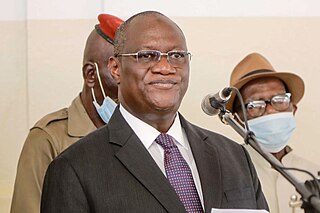Patrick Achi | |
|---|---|
 Achi in 2021 | |
| Prime Minister of Côte d'Ivoire | |
| In office 8 March 2021 –17 October 2023 |
This section contains text that is written in a promotional tone .(January 2024) |
In his capacity as Minister of Economic Infrastructure and later Prime Minister, Patrick Achi represented Côte d'Ivoire at economic, investment and development focused African and international conferences, round tables and forums. These include :
- Forum Afrique, Paris, France, 10 June 2021 : focusing on Côte d'Ivoire's economic resilience during the Covid-19 pandemic and its 2021 economic outlook.
- World Policy Conference, Abu Dhabi, 2–3 October 2021 : presented post-covid challenges for Africa and Côte d'Ivoire and led bi-lateral discussions to strengthen relations with the UAE. [17]
- MEDEF Forum, Paris, France, 19 August 2021 : discussions on challenges and opportunities for Côte d'Ivoire. [18]
- Expo 2020, Dubai, UAE, 25 November 2021 : presentation of Côte d'Ivoire's successes and opportunities to UAE, Gulf and Asian investors. [19]
- World Economic Forum, Davos, Switzerland, 23–24 May 2022 : presented Côte d'Ivoire's National Development Plan 'Vision 2030'. [20]
- IMF Annual Meetings, Washington, DC, USA, 10–16 October 2022 : Led the Ivorian delegation to the International Monetary Fund (IMF) and World Bank annual meetings. Met with World Bank President David Malpass, who reaffirmed the Bank's support for the country's Vision 2030 development strategy. [22] Mr Achi also had a discussion on global challenges and their impact on Africa with Kristalina Georgieva, Managing Director of the IMF.
- Accra Initiative Summit, Accra, Ghana, 22 November 2022 : African Heads of State summit during which the EU and Gulf of Guinea countries strengthened cooperation in the fight against terrorism and for regional development. [23]
- US-Africa Leaders Summit, Washington, DC, USA, 12–15 December 2022 : Hosted by President Joe Biden. Led the country's business roundtable. Met with Meta personnel to discuss digital progress in Côte d'Ivoire.
- Working visit, Paris, France, 21–24 February 2023 : Met key political figures including Bruno Le Maire, Minister of the Economy, Finance and Industrial and Digital Sovereignty, to discuss economic cooperation and support for major projects such as the Abidjan Metro and Abidjan airport extension. Met with Prime Minister Elisabeth Borne to discuss Franco-Ivorian friendship and partnerships, youth employment, agriculture, environmental protection and economic investment.
- Africa CEO Forum, Abidjan, Côte d'Ivoire, 5–6 June 2023 : opening ceremony speech on the importance of building and identifying African champions. [24]
- Summit for a New Global Financing Pact, Paris, France, 22–23 June 2023 : took part in discussions setting the foundations for a new global financing architecture beyond the Bretton Woods system to address climate change, the biodiversity crisis and development challenges. [25]
- Francophonie Games, Kinshasa, RDC, 30 July 2023 : supported Côte d'Ivoire's teams and promoted Ivorian culture and sport. [26]












